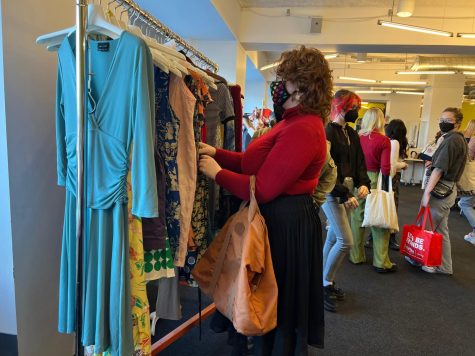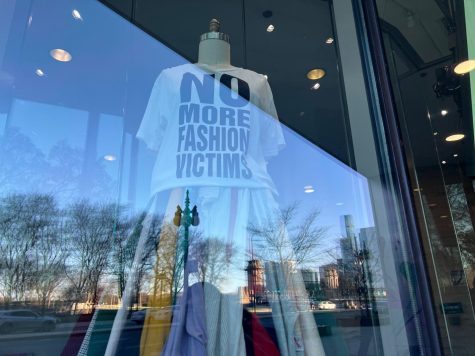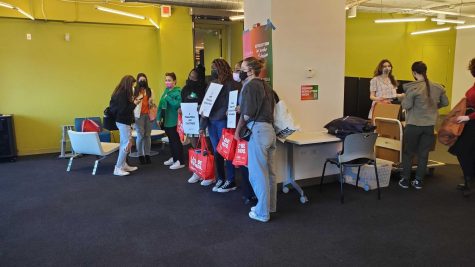Focus on sustainability: Fashion Revolution Week teaches students about issues in the fashion industry
May 2, 2022

Commonly taught in relation to recycling plastic and other materials, the Fashion Studies program is emphasizing the notion of sustainability and “reduce, reuse, recycle” further in its classes.
Ren Gouthro, a sophomore fashion studies major, said their classes have taught their students about the fashion industry and its production.
“We learn a lot about overseeing production, and especially with fast fashion, how bad it is for the employees and how poorly they’re treated,” Gouthro said. “It makes you think a lot more about where you’re buying your clothes and actually looking into it and understanding the manufacturing behind it.”
Lauren Peters, assistant professor in the Fashion Studies Department and director of the Fashion Study Collection, said Fashion Revolution Week is a global event, which was founded by the Fashion Revolution group in the wake of the Rana Plaza factory collapse in 2013.
“That was the most deadly garment manufacturing tragedy in human history,” Peters said. “Every Fashion Revolution Week, [organizers] help to facilitate a series of local and global events to raise awareness around sustainability in the fashion industry, as well as around labor issues in the fashion industry.”
The Fashion Studies program at Columbia joined its first-ever Fashion Revolution Week on April 18-24.

In a partnership between Columbia’s fashion studies, Fairtrade Chicago and Columbia’s Student Diversity and Inclusion, the trio created events for students and faculty to learn about sustainability and ethical fashion, along with labor issues in the industry.
Fashion studies’ first event was the Kickoff Tote Design Event on April 13, in which Columbia students were encouraged to decorate organic cotton tote bags that said “COLUM FASHION” to replace single-use plastic bags.
The next event was the Fashion Revolution Week Book Club on April 19. Peters hosted the event with the book, Consumed The Need For Collective Change: Colonialism, Climate Change and Consumerism by Aja Barber as their main focus.
Emily Hochbaum, junior fashion studies major, joined the book club in its discussion about the fashion industry and walked away having changed her views on consumerism.
“Even though I design clothes and make clothes here at Columbia, it’s also just made me think so much about who I am as a consumer and as a person that likes to shop and buy things,” Hochbaum said. “It’s really made me question consumerism as a whole — this idea that you just need things all the time when really you don’t, and fashion isn’t disposable.”
Columbia graduate Alithea Tashey taught an introductory visible mending class for Fashion Revolution Week’s visible mending workshop. Two mending techniques were taught: Darning, the art of weaving a patch over a hole, and Sashiko — the Japanese art of reinforcing frayed and torn material.

Its final event of the week was a clothing swap. Fashion studies partnered with Student Diversity and Inclusion to collect clothes throughout April. The event put out three clothing drop-off bins at the following locations: the Student Center, 754 S. Wabash; the Fashion Facility, 623 S. Wabash Ave.; and the SDI office, 618 S. Michigan Ave.
“Since this is an art school, we should be educated in every type of art and how people choose to wear what they wear,” said Janessa Tyler, a first-year photography major who attended the clothing swap. “With fashion being a big major at Columbia and a part of the fashion curriculum, I feel like having certain free things, like The Rack, and events like this really help bring out that gender-affirming idea.”
All clothes left over from the swap were donated to SDI’s free clothing store, The Rack.
Peters said starting next fall, “Sustainable Fashion Practice” will be a class fashion students can take to further their understanding of sustainability in the industry. Fashion Studies students can also now minor in Sustainable Fashion.
“Sustainability is one of the biggest existential issues facing the fashion industry today,” Peters said. “We’d be irresponsible for not centering this both in our curriculum but also in our department programming as well.”







